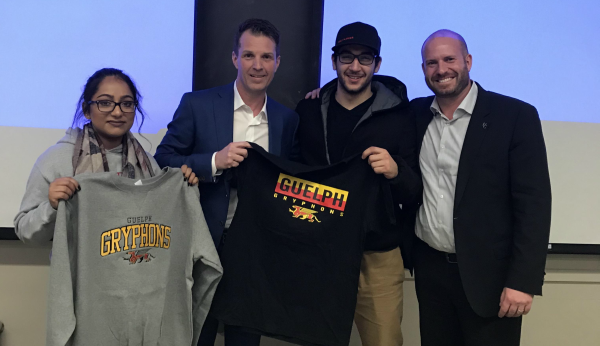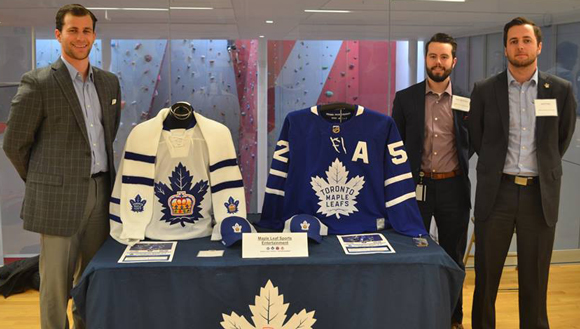The business of sports: U of G students engage with sports management leaders
The 2018 Winter Olympics in Pyeongchang not only brought the world’s best athletes to South Korea, it also brought tourists from around the world to cheer them on. Now that the Games are over, the post-Olympics influx of tourists is just beginning.
Increased tourism is one of the biggest perks to hosting the Olympic Games, says Scott McRoberts, director of athletics at the University of Guelph and course instructor for HTM 4130, “Business Impact on the Sport Industry,” offered by the School of Hospitality, Food and Tourism Management. He points out that two years after the 2010 Winter Olympics in Vancouver, the city remained the number one tourist destination in the world. Calgary recently announced that it is considering a bid to host the 2026 Winter Olympics.
McRoberts has taught sports management for 11 years at several universities. McRoberts teaches a new sports management course for students interested in the business side of sports. Students learn about the financial impact of sports tourism, event management, sponsorship, marketing, and contracts for both amateur and professional athletes.
“Sports gives you something new to talk about every day. I bring in real-life, real-time, current industry topics to discuss with the class,” Scott McRoberts
“The continuing growth of the industry and strength of the athletics program at Guelph offer students opportunities for experiential learning,” says McRoberts. “It opens their eyes to the industry, and they realize how big it is and how much impact it has on peoples’ lives and jobs.”
The course’s focus on the sports industry appealed to Eric Williams, a fourth-year marketing student. “What inspired me to take this course was the passion I have for watching sports and the sport industry as a whole,” he says. “Having Scott, the youngest [athletics director] in Canada, as the prof only made it more appealing. Scott brings a personal approach to the classroom, giving his take on current issues, but also engaging the class and wanting to hear and learn about the student perspective.”
The Olympics offer plenty of class discussion topics. “I love Olympic years,” says McRoberts. “It gives you a lot to talk about.”
Olympic host countries typically spend billions of dollars to build athletic facilities and improve their infrastructure ahead of the Games, but McRoberts says the true return on investment — or “legacy” — of the Olympics can only be calculated years later, long after the crowds have gone home. Is anyone using those Olympic facilities?
McRoberts says hosting major sporting events can have long-term benefits for host cities. He was actively involved in bringing the Pan Am Sports Centre to Toronto in preparation for the city hosting the 2015 Pan Am Games. Since opening in 2014, “It’s still being used to keep people active in sports,” he says of the facility.
Countries around the world vie for the chance to host the next Winter or Summer Olympics, not just for the opportunity to host the world’s best athletes, but also for the global recognition it brings. Hosting the Olympics is one of the best tourism marketing strategies, reaching billions of people worldwide.
Sporting events accounted for 81 of the top 100 television programs viewed in 2017, he adds, making them a huge source of advertising revenue, whether it’s multimillion-dollar commercials airing during the Super Bowl, sponsorship of NASCAR vehicles or Olympic athletes sporting their sponsors’ logos.

McRoberts has also invited sports management professionals as guest speakers to the class, including U of G alumni Jeff Marek, an anchor at Sportsnet; Anthony Attard, vice-president of sales at Sportsnet; and Brenda Woods, head of marketing at VISA Canada.
“It’s a great class,” says McRoberts. “Sports gives you something new to talk about every day. I bring in real-life, real-time, current industry topics to discuss with the class.”
Out of the classroom: Guelph Sports Management Association
The learnings and discussions from McRobert’s sports management course also goes beyond the classroom, through a new U of G student organization that builds off the passion for sport and provides students with opportunities to engage and connect with the sport industry.
The Guelph Sports Management Association (GSMA) is an accredited student organization that aims to engage the next generation of sports business leaders and connects students with industry professionals and organizations through keynote speeches, speaker panels and case competitions. This past semester, GSMA has organized networking events featuring MLSE, Toronto Blue Jays, Basketball Canada, Sportsnet and the Guelph Storm.

“The organization is a unique opportunity for students to gain insight into the business side of sport,” says Troy Lacoste, President of the GSMA. “We aim to provide students the chance to network with professionals in the industry.”
GSMA members can use these opportunities to prepare for a career in the sports industry by building their networks and interacting with peers, prominent sports industry leaders and other partnering companies.
"Guelph Sports Marketing Association was the first association on campus dedicated to the combination of both sports and business, which is why I knew I had to get involved,” says Kaitlin Freitag, Vice President of Events, GSMA.
“Learning about the sports industry, developing meaningful connections with peers and industry professionals, and discovering a career path that suits them are just a few ways students can benefit from the GSMA,” says Kaitlin.

Striving to go further than just the play-by-play of sport, the GSMA focuses on the strategic business models that are needed in order to evolve the dynamics of sport in relation to how sport is consumed, and how to engage the wider public market. It looks at all the ways professionals can be involved with a career in sport, outside of being a professional athlete.
“I played sports my whole life, but knew that not everyone can make it as a professional athlete,” says Hayden Stewart, Vice President of Marketing, GSMA. “However, there are plenty of other ways to still be a part of these professional teams, and many students don’t know about them. GSMA provides the path and opportunities needed in order to realize and learn more about your dream career.”
The group is open to all U of G students who are passionate about the sport industry.
Learn more about the GSMA.